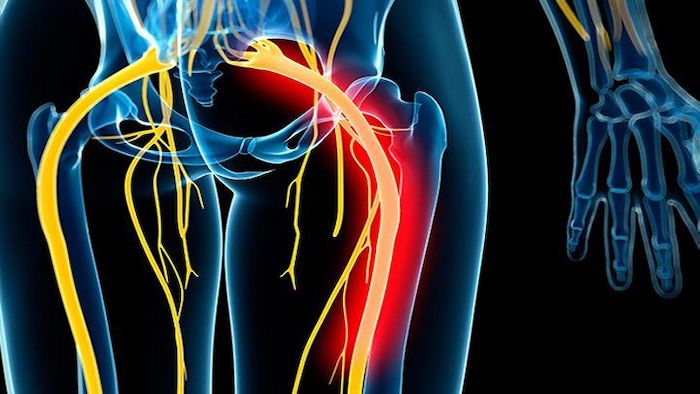
If you have ever experienced pain, tingling, and/or numbness along your sciatic nerve, you have likely heard the terms piriformis syndrome and sciatica.
While these two terms are sometimes used interchangeably, piriformis syndrome and sciatica are not the same and differ in terms of causes, symptoms, and treatments.
The Underlying Causes Are Different
Both sciatica and piriformis syndrome can cause symptoms in your lower back, buttock, and/or leg, but their underlying causes are different.
- Piriformis syndrome is a medical condition where your sciatic nerve is irritated or compressed by your piriformis muscle, deep in your pelvis. The sciatic nerve typically courses close to this muscle. The symptoms of piriformis syndrome may affect your buttock and hip and travel down your sciatic nerve into your thigh and leg.
- Sciatica is a set of symptoms, caused when a medical condition, such as a herniated disc or spinal stenosis, irritates or compresses one or more spinal nerve roots in your lower spine (and not the sciatic nerve itself). These nerve roots later merge to form the sciatic nerve. The medical term for sciatica is radiculopathy (radix is a Latin term indicating a root, as in the spinal nerve root and pathos is a Greek term for disease).
Piriformis syndrome may be caused by anatomic changes in your piriformis muscle and/or your sciatic nerve, trauma to your hip or buttock, or from sitting for prolonged periods. Sciatica can be caused by many problems that may affect your lower spinal nerve roots, such as herniated discs, spinal stenosis, or spondylolisthesis.
Identifying The Problem Based on Your Symptoms
Sciatica and piriformis syndrome symptoms overlap, and you may be confused about the actual source of your back and leg pain.
Here are a few unique pointers to help you understand where your pain may be originating from:
- Areas affected by pain:
- In piriformis syndrome, buttock and hip pain is typically more common than lower back pain.
- In sciatica, the leg pain is usually greater than lower back pain and the pain may radiate into your toes. The affected leg may also feel heavy.
- The effect of movement:
- In piriformis syndrome, the pain typically increases while sitting for long periods of time and/or during hip movements.
- In sciatica, raising the affected leg while lying down (while keeping the other leg straight) may induce pain.
Neurological symptoms, such as tingling and numbness usually occur in areas where the pain is felt. While these are relatively common patterns, the actual presentation can vary significantly, making it quite difficult to self-diagnose.
Treatment Options Vary for Piriformis Syndrome and Sciatica
It is essential to have the underlying cause of your back, buttock, and/or leg pain to be properly diagnosed by a medical professional to help formulate an effective treatment plan. Successful treatment depends on addressing the underlying cause of irritation or compression of your sciatic nerve or your spinal nerve roots.
For this reason, the treatment for piriformis syndrome usually differs significantly from a treatment plan for sciatica caused by a lumbar spine problem (such as a herniated or degenerated disc). It is possible to make your symptoms worse if you perform a stretch intended for piriformis syndrome if you have a lumbar herniated disc.
Consult your doctor for an accurate diagnosis of your lower back problem to help understand if your pain originates from your lower spine or your piriformis muscle. A doctor can conduct relevant medical tests to diagnose your pain and formulate an effective treatment plan.
Precision Pain Care and Rehabilitation has two convenient locations in Richmond Hill – Queens and New Hyde Park – Long Island. Call the Richmond Hill office at (718) 215-1888, or (516) 419-4480 for the Long Island office, to arrange an appointment with our Interventional Pain Management Specialist, Dr. Jeffrey Chacko.













